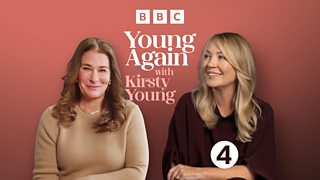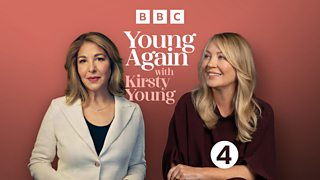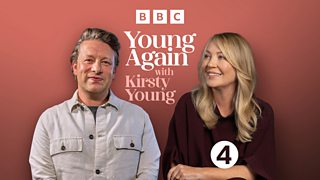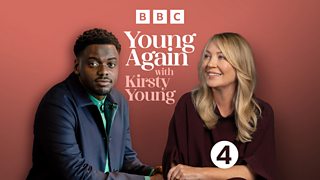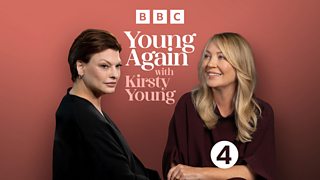Melinda French Gates: Six things we learned when she spoke to Kirsty Young
In her 大象传媒 Radio 4 podcast Young Again, journalist and broadcaster Kirsty Young takes her guests back to meet their younger selves and asks the question: if you knew then what you know now, what would you have done differently?
Melinda French Gates is an American philanthropist, former computer developer, and the ex-wife of Microsoft co-founder Bill Gates. In 2000, she and Bill Gates co-founded the Bill & Melinda Gates Foundation, a charitable organisation with the aim of improving healthcare and reducing extreme poverty across the world.
Here's the things we learned when she met Kirsty Young...

1. Melinda learnt at an early age the value of having quiet time to yourself
Melinda was one of four children brought up in Catholic family in Dallas, Texas.
I assumed women could be anything they were, so I didn't know we needed to fight for this changeMelinda on becoming a feminist
“I think for me, high school was such a formative time in an all-girls Catholic High School... We didn't actually have a chapel, but they had some designated rooms that were a chapel and we could go in there and [the nuns] taught us to spend time in silence.”
“I think I would go back and say to my younger self, ‘You are lucky to be learning this now because it's a value.’ It's something that they instilled in us that has helped me realise over many, many periods in my life that time and quiet and listening to your inner self is deeply, deeply important.”
The importance of making time for quiet reflection is something Melinda refers to many times in her conversation with Kirsty.
2. She has a great inquisitive nature first fostered by an early encounter with one of the pioneering home computers of the 1970s
“I grew up in a family where we were curious about things,” says Melinda, “and so I was very interested in math and science. When I was young, I was incredibly lucky that my parents brought an Apple II computer into our household – they borrowed it from a neighbour.”
Launched in 1977, the Apple II was one of the first successful home computers and drove the growth of the industry. It was the success of the Apple II that established Apple as a major business and ultimately the development of the first smartphones.
“I was just really curious about these adventure games and would play those mystery games on the computer,” says Melinda.
Melinda went on to complete a degree in computer science and then an MBA before joining Microsoft as a marketing manager responsible for developing a range of multimedia products including CD ROMs, Encarta and Cinemania.
3. Melinda has said she didn’t become a feminist until the age of 45 despite being known now as a great advocate for women’s equality
During the podcast interview Kirsty brings this up with Melinda, saying: “I have something that bothers me greatly which is you were born in 1964, yet you've said you weren't a feminist until 2009. Explain that to me.”
“If you think of it from my perspective...,” says Melinda, “to have a set of liberal teachers – basically all female teachers in my school, and all Catholic nuns – I just assumed the world was that way. I assumed women could be anything they were, so I didn't know we needed to fight for this change.”
“It wasn't until after I had worked at Microsoft and saw how difficult that was, that a Catholic nun in Seattle asked me to speak and said, ‘Are you a feminist?’ And I didn't even know what to say. Like, I hadn't grappled with the term.”
“But I took time again in silence and seeing what I had been up against, what my friends had been up against that I was ready to say, ‘Oh, I need to embrace that term [that] no one had ever really taught me.’ Maybe it's because I was in such a male-oriented world, especially in college – computer science and an MBA, and then into to Microsoft and business – but I just sort of didn't know how important it was.”

4. Forbes recently listed Melinda’s personal fortune at over $10 billion – What’s the downside of being so wealthy?
“I think sometimes when you're wealthy, you walk into a room and you just assume you're the most important person in the room or people treat you as if you're the most important person in the room, or they treat you as if you know something you don't know,” reflects Melinda.
That you're special in some way because you're wealthy.Melinda on the biggest misconception people have about the super rich
"You have to be very careful in those situations to try and create equality or you're never going to really, truly learn. And sometimes money can situate you in a place where you know you shouldn't necessarily be – you're not the person at the table who should be making that decision.”
“I'll give you an example: if we're trying to help lift up, let's say in the Seattle community, people of colour. By God, I am not the most powerful person at the table. I should have probably the last voice in that conversation. I darn well better be in listening mode because guess who has the answers? The people living in that community and who am I to come in and say, ‘Well, this is the solution, this is how we should, you know, set something up in your community.’”
“No, they have a lived experience, so you have to work hard to create true equality at that table so that you can learn what needs to be done and then to help people lift themselves up.”
5. The name of the Bill and Melinda Gates Foundation is very important to her
The Foundation was formed in 2020 from merging together the William H. Gates Foundation and the Gates Learning Foundation.
“At that time,” Melinda picks up the story, “the then CEO Patty Stonesifer said: ‘It's really important that we don't let anybody shorten this name to the Gates Foundation because they will always assume it's Bill’s foundation,’ and I was like, ‘Oh, right.’ Like I hadn't thought of that so we made sure everywhere we went it was the Bill and Melinda Gates Foundation, and that was a sign of equality, which we did and do have at the Foundation. It's still the Bill and Melinda Gates Foundation.”
6. Melinda admits to struggling with the pressure that came with being married to Bill Gates
“I felt like after we got married in 1994, I was losing my identity. I actually had a crisis of self a couple of years into the marriage because all of a sudden we'd moved into a large house behind a gate with security. I'd quit my job at Microsoft. I had a young baby, and I literally had a crisis of self, like, ‘Whoa, what have I done?’ ”
Melinda describes how she found her immense wealth confusing: “If you go into a department store and say, ‘You're going to buy yourself a pair of slacks and a sweater’ and realise you could buy everything on that floor, that's confusing."
"You just can't think in those terms, you have to think about, ‘Okay, what would I do when I was growing up?’ I would trade off buying a sweater versus a pair of jeans based on the money that I had, and you have to still think of it that way so that you don't walk out of the store with 10 sweaters and 10 pairs of slacks.”
“When you are in a position of wealth, people want things from you for different reasons and try to move into your circle. And you have to be very careful about who you choose to let in. But over time, people show their true colours. You just have to look for it and if you see them, you push them out very, very quickly.”
In an attempt to give her children an ordinary childhood, Melinda talks about some of her strategies. "When they were in elementary school, they did not watch their dad on TV to the point where one of the school teachers had to come to me when our youngest daughter was in kindergarten to say, ‘You actually need to talk to her more about who her father is because she's hearing it in the classroom from other kids and it's going right over her head’."
"The other thing I would do is when we would show up for school for the first three weeks, I was the one that drove them, so people didn't know who their dad was, and they started in school under my maiden name. So we got three weeks where we were just one of the normal families showing up until their dad would start showing up and dropping them at school [but] by then the families knew me and they knew our kids well enough to go, ‘Oh, okay, that's those kids.’”
In 2021, Melinda announced that she and Bill were divorcing. “I would like to have understood sooner in my life that it's okay to pivot,” she says. “You think you're on one path in life, and sometimes you find out you need to pivot. I mean, it's well known I got a divorce a few years ago and guess what? I'm more than okay on the other side. I'm about to turn 60, but it's okay. It's not only okay. It's great!”

